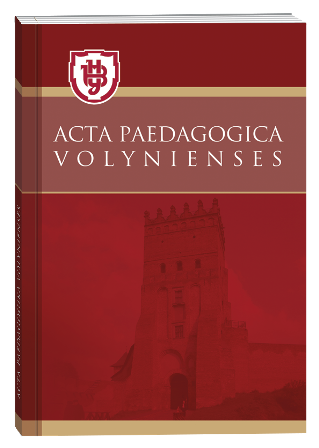FORMATION OF THE PROFESSIONAL COMPETENCES OF THE FUTURE EDUCATOR OF THE PRE-SCHOOL EDUCATION INSTITUTION USING INTERACTIVE LEARNING MEANS
DOI:
https://doi.org/10.32782/apv/2024.4.7Keywords:
professional competences, future educator, educational attainment, interactive learning, education.Abstract
The article examines the problem of forming the professional competencies of a future teacher of a preschool education institution by means of interactive learning. Having analyzed the works of scientists regarding the concept of «competence», we derived our own concept, so we will understand by the definition of «competence» the basic quality of the future educator of a preschool education institution, which includes a set of interdependent qualities of the personality necessary for professional activity, the skill to effectively carry out activities with the help of practical knowledge. It was determined that during interactive training it is important to observe the following rules: all students of higher education should participate in the work; it is necessary to pay due attention to the psychological readiness of students of higher education, which can help in the learning process to avoid stiffness and fixation of the participants; each of the acquirers in the process of using interactive technology must be heard; special attention should be paid to the division of participants into groups. It has been determined which future teacher of a preschool education institution should have the following professional competencies: respect for each individual, their views, opportunities, needs, the ability to communicate with each preschooler, the ability to create conditions for children to freely choose types of work; the ability to create an atmosphere where children can freely make certain decisions, express their views, opinions, etc.; to be able to provide preschool children with help and support for children’s initiative if necessary, to be able to captivate them so that children have a desire to independently participate in various types of work, the ability of the educator to create a friendly atmosphere, to be able to direct the child’s emotions in a positive direction; the ability to develop children’s communication skills that allow them to resolve conflict situations with their peers; the ability to create conditions for mastering cultural means of activity; the ability to organize educational activities that will contribute to the development of thinking, language, imagination, personal, physical, artistic and creative development of children; the ability to assess the individual development of each child.
References
Белєнька Г. В. Теоретико-методичні засади формування професійної компетентності вихователів дошкільних навчальних закладів в умовах ступеневої освіти: автореф. дис. … д-ра пед. наук, спец. 13.00.08 – дошкільна педагогіка. К., 2012, 38 с.
Лакуста О. Система управління процесом підготовки вихователів закладів дошкільної освіти до соціалізації дітей дошкільного віку. Науковий пошук молодих. Вип. 2. 2018. С. 117–123.
Мисик О. С. Методологічні аспекти формування фахової компетентності в майбутніх вихователів дітей дошкільного віку. Педагогічний альманах. Вип. 38. 2018. С. 119–126.
Печенко І. П. Сучасний дошкільний заклад як провідна інституція соціалізації особистості у дошкільному дитинстві. Рідна школа. № 6, 2008. С. 65–67.
Писарчук О. Формування освітньо-розвивального середовища як компонент професійної підготовки майбутніх вихователів до інноваційної діяльності. Підготовка майбутніх фахівців початкової та дошкільної освіти: стратегії реформування : колективна монографія. Тернопіль : [Осадца Ю. В.]. 2019. С. 155–169.
Чайка В. Психолого-педагогічні умови підготовки майбутнього фахівця дошкільної освіти до саморегуляції професійної діяльності в процесі навчання у закладах вищої освіти. Підготовка майбутніх фахівців початкової та дошкільної освіти: стратегії реформування : колективна монографія. Тернопіль : [Осадца Ю. В.]. 2019. С. 137–154.
Шинкаренко В. В., Клімова Л. В., Мазур І. А., Міхіна Н. О. Acta Pedagogiсa Volynienses, 3, 2023. С. 78–83, doi: https://doi.org/10.32782/apv/2023.3.12







